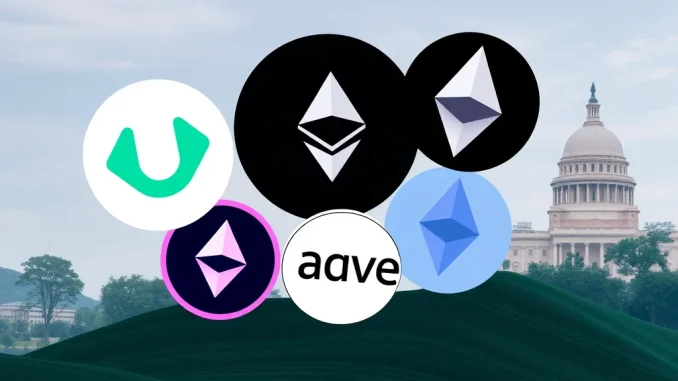
The world of decentralized finance (DeFi) is buzzing with optimism! Have you noticed certain **DeFi tokens** spiking recently? This isn’t just market noise; it’s tied to significant developments regarding **cryptocurrency regulation** in the United States.
Why Are DeFi Tokens Reacting to the SEC?
A key reason behind the recent surge in **DeFi tokens** is a potential shift in the stance of the U.S. Securities and Exchange Commission (SEC). SEC Chair Paul Atkins recently hinted that the agency is exploring an “innovation exemption.” This concept aims to create a clearer path for on-chain project development, potentially reducing regulatory hurdles for decentralized protocols.
This news comes after a notable DeFi roundtable discussion held in Washington, D.C., suggesting increased dialogue between regulators and the crypto industry. For many in the space, this signal from the **SEC** is a welcome change, moving towards a more collaborative approach rather than just enforcement.
Which DeFi Tokens Saw Significant Gains?
Following the optimism sparked by the SEC’s comments, several prominent **DeFi tokens** experienced notable price increases on Tuesday. These included:
- Uniswap (UNI): Saw a price gain of 23%.
- Aave (AAVE): Rose by 16%.
- Sky (SKY): Increased by 15%.
These tokens represent major protocols within the decentralized finance ecosystem, primarily built on the **Ethereum** blockchain. Their positive price action reflects market confidence that a more accommodating regulatory environment could foster growth and adoption for these platforms.
What Could an ‘Innovation Exemption’ Mean for DeFi and Ethereum?
The prospect of an **innovation exemption** is potentially a game-changer for the DeFi space and the underlying **Ethereum** network. Here’s what it could imply:
- **Reduced Uncertainty:** Regulatory clarity is a major factor hindering institutional adoption and broader development. An exemption could provide much-needed certainty for developers and investors.
- **Faster Development:** With a clearer framework, projects might face fewer legal roadblocks, allowing for quicker iteration and deployment of new DeFi applications.
- **Increased Adoption:** Greater regulatory comfort could attract more users and traditional financial institutions to the DeFi ecosystem.
- **Boost for Ethereum:** As the primary network for most DeFi activity, a flourishing DeFi sector directly benefits the **Ethereum** ecosystem through increased transaction volume and network usage.
While the details of the exemption plan are still emerging, the initial indication suggests a potential path forward for navigating **cryptocurrency regulation** in a way that supports technological advancement rather than stifling it.
Navigating the Future of Cryptocurrency Regulation
The **SEC**’s exploration of an **innovation exemption** is a significant step, but it’s important to remember that the regulatory landscape is complex and constantly evolving. The dialogue between regulators and the industry is crucial for finding a balance that protects consumers while allowing innovation to thrive.
This development highlights the ongoing evolution of **cryptocurrency regulation** globally. As governments grapple with how to oversee decentralized technologies, approaches like potential exemptions signal a recognition of the unique nature of blockchain and DeFi.
Summary: A Glimmer of Hope for DeFi
The recent spike in **DeFi tokens**, including Uniswap, Aave, and Sky, underscores the market’s sensitivity to regulatory news. The **SEC**’s mention of an “innovation exemption” has injected a sense of optimism into the decentralized finance sector. This potential shift towards a more collaborative approach to **cryptocurrency regulation** could significantly benefit the **Ethereum** ecosystem and pave the way for greater adoption and development within DeFi. While the path forward requires careful navigation, this signal from the **SEC** is viewed by many as a positive step towards a more defined and supportive regulatory environment for innovation in the digital asset space.



